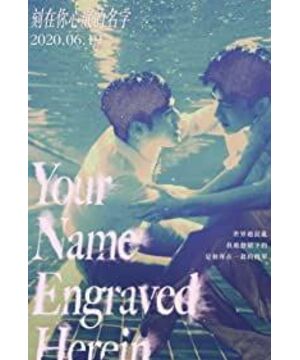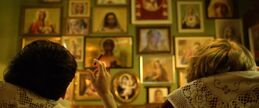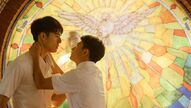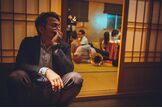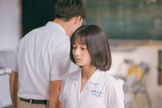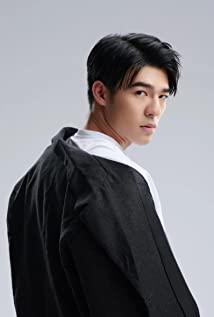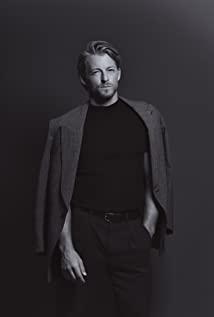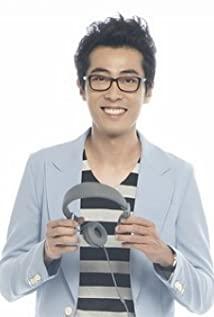four symbols
1. Waterfall
The Nicara (not Nicaragua) Falls at the end of the credits clearly pay homage to the Iguazu Falls in "Breakthrough". The latter is the end of the journey that the two protagonists, Li Yaohui and He Baorong, were thinking about going, but in the end, the two parted ways. Different from Li Yaohui's famous line "Because I always feel that there should be two people standing under this waterfall", Ah Han and Birdy appeared on the waterfall viewing platform at the same time but missed it.
The Canadian tour guide explained the mermaid's love story that seemed to be irrelevant to the plot, but it was actually a reference to the Bible "Song of Solomon" 8:7 that appeared in the header of the photo, "Love, many waters cannot be extinguished, and floods cannot be submerged. Treasures in exchange for love are all despised.”
In addition, the cover of the vinyl record played by the opening priest is also the waterfall. The record's "Danny Boy" is also used as the background music for Niagara Falls in the future, implying that Ahan and Birdy's trip to the waterfall is related to paying tribute to the priest.
In the Beiying version, the vinyl cover has a clear waterfall, and the cover also writes the lyrics of "Oublie-le Je t'aimais". Birdy also mentioned that he wants to go to a special place to have sex with the person he likes, and one of the places is a waterfall.
2. Park Old Man
It pays tribute to the new Taipei Park where gay men were having fun in the 1970s in "Nice Son", and it is also an adaptation of the director/screenwriter's own experience in Taichung Park. At that time, the information was not developed, and 228 Park became a place for gay men to communicate. The self-exploration of young comrades and the body temperature of old comrades in "Niezi" were satisfied in some way. However, this clip wants to express that Ah Han's feelings cannot be separated from flesh and spirit: although he realizes that the object of sexual desire is male, Zhang Jiahan also finds that only the love union with Birdy can make this thing continue. Yelling at Park Arbor "I'm not the same as you" doesn't mean different sexual orientations, but different objects that need to be projected. A similar concept also appeared in "Midsummer Light Year". In addition, the flag clearly appears on the pillars of the pavilion, which seems to be a political innuendo to match the whole event.
3. Birdy
This film pays homage to 1984's "Birdy", such as Wang Baide holding his breath for a long time, jumping in the corridor, and the movie playing in the solar system box. The boats heading for Magong and the distant view of the waterfall have the silhouette of birds flying by, which can obviously be regarded as Birdy's own projection. "It's stupid, why do you keep flying with it." Wang Bode said this after seeing the seabirds in the sky, implying that no matter where Ah Han went to the ends of the earth, he would never leave him. Looking around the whole film, only when the two are alone, when Ah Han is by Birdy's side, he will happily climb up, jump up and down like a bird (jukebox, steal balloons, end credits), which seems to imply that only Zhang Jiahan In order to bring Wang Bode spiritual freedom.
4. The Dragster on the Flyover
Qi Jiawei is known as Taiwan's first openly gay male. In the late 1980s, he often raised funds for AIDS patients on the Zhonghua Road flyover. In 1986, he petitioned the Legislative Yuan to marry a male notarized. He was interviewed and detained at the Taipei Detention Center, where he was treated like a political prisoner. For the next 30 years, he continued to strive for the rights of same-sex marriage through judicial, administrative and legislative channels. In 2015, Qi filed a petition for constitutional interpretation to the Court of Justice. In 2017, the Judicial Yuan issued Justice's Interpretation No. 748, declaring that not allowing same-sex marriage is unconstitutional. In 2020, Qi and Tsai Ing-wen are the only two Taiwanese to be included in Time Magazine's Top 100 Most Influential People. The screenwriter Da Lala put "Qi Jiawei" into his lines, and it was obvious that he wanted to tell the audience about the oppression of sexual minorities during the lifting of the law 30 years ago.
two inserts
1. "The World" , a work published by Cai Lanqin after his death in June 1987. According to the director, "it was known as a classic gay love song in those days". "This World" appeared four times in the film, and all of them were started by Birdy. In addition to being a love song, it can be interpreted as: Wang Baide still has a slight expectation for this "world that suppresses us". Turn it into a song to express it.
The first time it appeared was a jukebox by the stairs. Birdy noticed that A-Han was stealing a kiss in the box, and responded vaguely with San Mao's famous line, and ordered this song to send to A-Han. This is Wang Bode's first sigh after discovering, "Ah, there are still people in this world who can understand me and who can love me".
The second time it appeared was a military song competition. Here, the mirror is deliberately focused on the two people looking at each other in circles, as if there are only Zhang and Wang left in the world. "Ah, I really hope the world revolves around the two of us." Birdy used the military song competition to smuggle his feelings for A-Han.
The third time it appears is after stealing the balloon. Birdy realized the meaning of good night, it turned out that the person he loved also loved him, and ecstatically sang "Our world is not as bad as you said" in the back seat of the motorcycle, but unfortunately the people in the front seat didn't notice it at all.
The fourth occasion was on the streets of Quebec. Thirty years later, the old Birdy was finally able to face his emotions honestly, so after singing, he could calmly say "Actually, I loved you very much at that time."
2. "Crowded Paradise" , a work published by Chen Sheng in May 1988, the director once wanted to name the film "Crowded Paradise": Adam and Eve's Eden Garden is too crowded to accommodate gays, "Then we will find it ourselves. A paradise."
It first appeared in Ah-Han's Guess Who I Call and runs through to the scene where the two share a locomotive to the cinema. The lyrics "How many springs can we encounter in a lifetime, how can passionate people understand that they have loved only once in their lifetime" fits Zhang Jiahan's budding romance. The second time this song appeared in the hot fried shop Birdy deliberately played it to Ban Ban, when the two shared a headset. The background is also the lyrics, Ah Han asked the two of them, "Are you in a relationship now?" Birdy's intentional refutation but reluctantly tacitly looked back is worth pondering.
View more about Your Name Engraved Herein reviews


